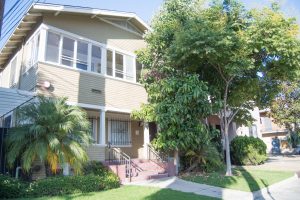New housing opens for veterans

The new student veteran housing building is located on 32nd Street and can house up to 10 veterans. (Emily Smith | Daily Trojan)
Last spring, Brandon Wexler would wake to the sound of his alarm blaring at 5 a.m. every morning, after sleeping only three hours the night before. He’d pull on a T-shirt and a pair of jeans and shuffle out the door to walk his dog before his morning commute to USC.
Wexler would then stumble into his vehicle, still rubbing the sleepiness out of his eyes. Fighting the endless red lights and cars’ wheels that seemed to be glued to the streets, he’d pull up to USC just in time to scramble into his 8 a.m. lecture.
Unlike the majority of undergraduate students, Wexler, a student veteran and senior majoring in cognitive psychology, did not live near campus. He lived 20 miles away in San Pedro.
This year is different, though. Now he only has to walk 10 minutes to get to campus. Along with seven others, Wexler is living in a new complex near campus reserved specifically for student veterans, many of whom face the constant struggle of commuting to campus on a daily basis, hailing from as far as Bakersfield, Oceanside and even Desert Hot Springs.
“Because we’re older, many of us have families and so maybe you buy a home somewhere and your family is there,” Wexler said. “And of course, your spouse has their business there or they’re working there and your kids are in school there. You can’t just uproot them and take them and move them to USC.”
Wexler, who is the president of USC Veterans Association, is the resident advisor for the new student housing, which is tucked along 32nd Street across from the Shrine Parking Structure. The complex is home to both a single-story and a two-story house with 10 bedrooms and six bathrooms rented to any student veteran, regardless of gender or class. Veterans pay $1,075 a month to live there.
“Being on campus like this — it’s hard to put into words how much less stressful and less strenuous it is,” said junior Evan Hagen, a student veteran who also used to commute from San Pedro. “Career fairs, all kind of professional development opportunities, the ability to partake in clubs really closely — [commuting] really detracted from the full experience of actually being here. Sometimes it almost felt like treating it like community college.”
As the complex turns into home, the veterans hope to use it as a way to further assimilate themselves into USC by hosting get-togethers so that the rest of the student community can get to know them. They also want the housing complex to become a way to keep their own community deeply connected. The student veteran population at USC consists of around 800 people.
“For all the veterans that are going to be able to partake in that, we’re all going to be able to support each other be there for each other if we need it and clear our minds together and figure stuff out if we need to,” Hagen said.
Though many of the veterans taking advantage of the new housing are single, those with families can still live there as long as their dependents don’t permanently live with them. Some are using the housing to cut their commute during the week and are planning to either visit or receive visits from family on the weekends, Wexler said.
Many of the veterans that have typically stayed near campus throughout the years have done so on their own, but have found themselves in a different situation than most USC students since they enrolled in college after serving in the military.
“It’s a little awkward being in your thirties and having had a 20-year military career and then moving into the Lorenzo where you have to share a bedroom with somebody,” said Wexler, who recalled a situation where a male graduate student veteran was assigned to room with two 19-year-old women.
The idea to create the veteran student housing came up last year and was developed by the USC Veterans Association and the University. As the plan developed, those working on the project looked into accommodating the veterans’ Monthly Housing Allowance into USC Housing’s payment calendar, which normally expects students to pay each semester in full, according to Kris Klinger, assistant vice president of USC Hospitality and Radisson Hotel. They also focused on making 12-month housing assignments available to the veterans rather than the typical eight-to-nine month assignments for which students are typically housed at the University.
Though the veterans have only been living in the housing since Aug. 15, those involved with its creation are already thinking about the future.
“Our goal is to see how we can continue to evolve,” Klinger said. “The veteran community here at USC is fairly strong and supportive through different groups and entities. The possibilities are unlimited. It’s just what’s next and looking for those opportunities and now all our eyes are open to that and what can we do next.”
